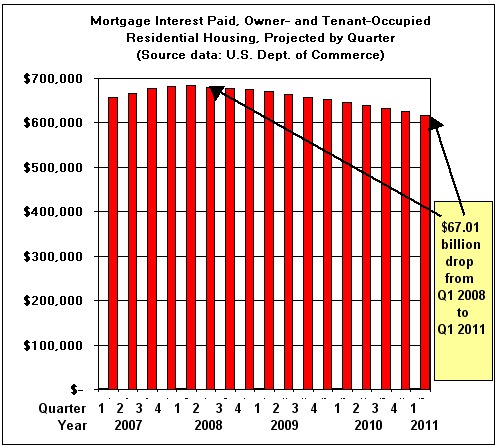A recent report by the U.S. Dept. of Commerce calculates that $67 billion a year less in home interest payments are being made than in early 2008. Many observers believe that this drop is primarily due to home walkaways, and that the cash freed up is largely flowing back into the consumer economy.
The hard number gives credence to what consumer advocates and reporters have been writing since 2009: a dollar not sent to Wall Street is a dollar to be spent on Main Street.
People saying this may have been fringe thinkers when I wrote "What's Good for Americans Is Good for America: The Case for Walking Away From Debt" in October 2009. By December 2009 it was no longer fringe thinking, with this quote in the Wall Street Journal:
"It's a stealth stimulus," says Christopher Thornberg of Beacon Economics, a consulting firm specializing in real estate and the California economy. "The quicker these people shed their debts, the faster the economy is going to heal and move forward again."
In November 2010 the Los Angeles Times more pointedly published an article by reporter Don Lee with the headline "Millions of homeowners keep paying on underwater mortgages," and a sub-headline of:
The payments absorb billions of dollars that might be used for other forms of consumer spending, creating a drag on the overall economy.
The article described the potential economic fallout of one family deciding to keep making mortgage payments they could barely afford:
Meantime, the Hineses will keep delaying that new roof, depriving a local roofer of business. They're unlikely to redecorate or upgrade the kitchen either, as millions of families were doing before the recession - more potential losses for local businesses, not to mention the car dealers, clothing and consumer electronics stores and manufacturers of the products that the Hineses won't buy.
The empirical evidence was in -- and now the numbers are in. Whether the $67 billion being freed up is specifically due to walkaways, or short sales, or deed-in-lieu handbacks to the lenders, it still comes down to consumers saying "sayonara" to the banks.
Not every dollar is flowing to Main Street. Clearly some is going into savings, since cash is replacing home as the new nest egg. But in a hurting economy, what I'm hearing in interviews from coast to coast is that people are investing spare cash in personal and family infrastructure, from stocking up on socks to doing preventative maintenance on their cars.
(An article from Bloomberg.com cites Zillow and JPMorgan Chase as coming to the same conclusion. Bloomberg.com's figure of $50 billion is lower than mine; I calculated the change from 1st quarter 2008 to 1st quarter 2011 from the Dept. of Commerce report.)
The $67 billion number gets more interesting looking at the heading of the U.S. Dept. of Commerce spreadsheet: "Mortgage Interest Paid, Owner- and Tenant-Occupied Residential Housing." [italics mine]

Not included: dollars no longer going to pay principal. Another $10 billion going to Main Street? Or $20 billion?
Not included: dollars not being paid in interest or principal on credit card walkaways. Tack on $10 billion more? (News releases frequently start out with the spin that this is because Americans are paying down their credit cards -- but not even the banks or credit reporting agencies are claiming that as the sole reason for shrinking credit card payments.)
Not included: dollars not being paid in interest when people sell their financed car and buy a cheaper one for cash. (This tends to be interest only, as the principal is paid off if they sell the car for enough to cover the principal.)
We are pushing $100 billion here that not going to Wall Street -- about the same amount as total annual unemployment benefits for 2010, a sum of money that has kept a lot of people with a roof over their head. It's still chump change compared to the trillions in TARP money, but the walkaway trend is accelerating.
Going back to the Department of Commerce figures, the drop in interest payments on homes during 2008 was 0.36%. The rate of drop-off for first quarter 2011 projects out to a drop-off rate of 4.92%. If the trend continues -- trends tend to do that -- the drop-off for 2011 could be over 5% -- or another $30 billion freed up to spend on Main Street.
(To make some attempt at "balance," where is none is possible: the spin according to the Mortgage Bankers Association -- famous for defaulting on their $79 million mortgage in Washington, DC -- is that people are refinancing at lower interest rates, presumably in droves. However their own report says that more people are trying to refinance at lower rates -- there is no evidence in their figures that this is or has been a significant part of the falling home interest payments. In fact the MBA reported in Fall 2010 that refinance applications were dropping.)